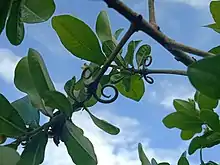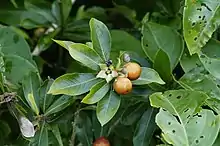Hugonia mystax
Hugonia mystax is a species of plant in the family Linaceae found mainly in the dry forests of peninsular India and Sri Lanka. It is a scandent shrub, sometimes growing liana-like over other trees and bears yellow flowers and orange to red fruits in the rainy season. The branchlets are leafless at the base and instead have a pair of recurved spines which bear a resemblance to a moustache, giving rise to the epithet mystax, Latin for moustache.

| Hugonia mystax | |
|---|---|
 | |
| Scientific classification | |
| Kingdom: | Plantae |
| Clade: | Tracheophytes |
| Clade: | Angiosperms |
| Clade: | Eudicots |
| Clade: | Rosids |
| Order: | Malpighiales |
| Family: | Linaceae |
| Genus: | Hugonia |
| Species: | H. mystax |
| Binomial name | |
| Hugonia mystax L. | |
The Tamil name, mothira-kanni, refers to the resemblance to a ring.[1] The roots of the plant are astringent and bittersweet, and are used to treat fevers, verminosis, and inflammations.[2]
The species is common in the dry scrub and tropical dry evergreen forests of peninsular India south from Maharashtra to Orissa.[3] It flowers according to the rains, twice a year in some parts of the peninsula.[4] The flowers are pollinated by Apis bees.[5] The fruits are eaten by birds and seeds may be dispersed by them.[6] The leaves are used in traditional medicine and used as an anti-inflammatory.[7]
References
- Gamble, J.S. (1915). Flora of the Presidency of Madras. Volume I. London: Adlard and Son. p. 126.
- P. K. Warrier, V. P. K. Nambiar (1993). Indian Medicinal Plants: A Compendium of 500 Species (reprint ed.). Orient Blackswan. p. 183. ISBN 9788125003021.CS1 maint: uses authors parameter (link)
- Gavade, B. G. (2009). "Rediscovery of Hugonia mystax Linn.(Linaceae) from Maharashtra, India". Journal of the Bombay Natural History Society. 106 (1): 126–127.
- David, J. P.; Murugan, B.S.; Manakadan, R. (2012). "Seasonality in fruiting of fig and non-fig species in a tropical dry evergreen forest in Sriharikota Island, southern India". Tropical Ecology. 53 (1): 1–13.
- Das, K. R. (2006). "Sexual system, breeding system and pollination in some tropical plant species.". In Raju, A.J.S. (ed.). Pollen and pollination ecology research. pp. 17–58.
- D. Narasimhan; John Mathew; Kavin Paulraj; S.M. Selvarathinam; P. Dayanandan (1993). "Frugivorous Birds and the Conservation of Dry Evergreen Forest". In Verghese, Abraham; S. Sridhar; A. K. Chakravarthy (eds.). First National Seminar on Changing Scenario of Bird Ecology and Conservation. 12-15 November 1993. Bangalore: Ornithological Society of India.
- Parthasarathy, N.; Vivek, P.; Anil, K. (2015). "Liana Diversity and Their Ecosystem Services in Tropical Dry Evergreen Forest on the Coromandel Coast of India.". In Partharasarathy, N. (ed.). Biodiversity of Lianas. Springer. pp. 161–178. doi:10.1007/978-3-319-14592-1_10.
| Wikimedia Commons has media related to Hugonia mystax. |